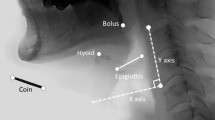Abstract
Timely hyolaryngeal excursion and laryngeal closure are essential for safe transfer of the bolus during the pharyngeal swallow. The temporal measures stage transition duration (STD) and laryngeal closure duration (LCD) represent these physiological events. The purpose of this investigation was to determine whether small changes in bolus consistency and volume affect these temporal measures in poststroke patients who aspirate, poststroke patients who do not aspirate, and nonneurologically impaired control subjects. STD and LCD were obtained by frame-by-frame analysis of the videofluoroscopic examinations of 5 and 10 ml thin and nectar thick liquids. Using a three-way analysis of variance, STD was significantly different between the control group and the two poststroke groups; however there was no difference between the two stroke groups. There was no difference among the three groups on LCD. Bolus consistency and bolus volume had no effect. Clinical implications of these findings are discussed.




Similar content being viewed by others
References
Logemann JA. Evaluation and treatment of swallowing disorders, 2nd ed. Austin, TX: Pro-Ed; 1998, p. 1-8.
Martino R, Foley N, Bhogal S, Diamant N, Speechley M, Teasell R. Dysphagia after stroke: incidence, diagnosis, and pulmonary complications. Stroke. 2005;36:2756–63.
Kim Y, McCullough GH, Asp CW. Temporal measurements of pharyngeal swallowing in normal populations. Dysphagia. 2005;20:290–6.
Kendall KA, McKenzie S, Leonard RJ, Goncalves MI, Walker A. Timing of events in normal swallowing: a videofluoroscopic study. Dysphagia. 2000;15:74–83.
Robbins J, Hamilton JW, Log GL, Kempster GB. Oropharyngeal swallowing in normal adults of different ages. Gastroenterology. 1992;103:823–9.
Kim Y, McCullough GH. Stage transition duration in patients poststroke. Dysphagia. 2007;22(4):299–305.
Power ML, Hamdy S, Singh S, Tyrrell PJ, Turnbull I, Thompson DG. Deglutitive laryngeal closure in stroke patients. J Neurol Neurosurg Psychiatry. 2007;78:141–6.
Park T, Kim Y, Ko D, McCullough G. Initiation and duration of laryngeal closure during the pharyngeal swallow in post-stroke patients. Dysphagia. 2009;25:177–82.
Bisch EM, Logemann JA, Rademaker AW, Kahrilas PJ, Lazarus CL. Pharyngeal effects of bolus volume, viscosity, and temperature in patients with dysphagia resulting from neurologic impairment and in normal subjects. J Speech Hear Res. 1994;37:1041–9.
Lazarus CL, Logemann JA, Rademaker AW, Kahrilas PJ, Pajak T, Lazar L, et al. Effects of bolus volume, viscosity, and repeated swallows in non-stroke subjects and stroke patients. Arch Phys Med Rehabil. 1993;74(10):1066–70.
Logemann JA, Pauloski BR, Rademaker AW, Kahrilas PJ. Oropharyngeal swallow in younger and older women: videofluoroscopic analysis. J Speech Lang Hear Res. 2002;35:434–45.
Dantas RO, Kern MK, Massey BT, Dodds WJ, Kahrilas PJ, Brasseur JG, et al. Effect of swallowed bolus variables on oral and pharyngeal phases of swallowing. Am J Physiol. 1990;258:675–81.
McCullough GH, Wertz RT, Rosenbek JC. Sensitivity and specificity of clinical/bedside examination signs for detecting aspiration in adults secondary to stroke. J Commun Disord. 2001;34(1–2):55–72.
McCullough GH, Wertz RT, Rosenbek JC. Age, gender, size, consistency effects on swallowing function in adults between 21 and 99 years of age. Presented at the 10th Annual Meeting of Dysphagia Research Society, Alburquerque, NM, 2001.
Gordon C, Hewer RL, Wade DT. Dysphagia in acute stroke. Br Med J. 1987;295:411–4.
Smithard DG, O’Neill PA, England RE, Park CL, Wyatt R, Martin DF, et al. The natural history of dysphagia following a stroke. Dysphagia. 1997;12:188–93.
Kim Y, Park T. Age and gender differences of laryngeal closure duration during normal swallowing. Korean J Commun Disord. 2007;12:521–31.
Logemann JA, Gensler G, Robbins J, Lindblad AS, Brandt D, Hind JA, et al. A randomized investigation of three interventions for aspiration of thin liquids in patients with dementia or Parkinson’s disease. J Speech Lang Hear Res. 2008;51:173–83.
Logemann JA, Pauloski BR, Rademaker A, Cook B, Graner D, Milianti F, et al. Impact of the diagnostic procedure on outcome measures of swallowing rehabilitation in head and neck cancer patients. Dysphagia. 1992;7:179–86.
Logemann JA, Pauloski BR, Rademaker AW, Colangelo LA, Kahrilas PJ, Smith CH. Temporal and biomechanical characteristics of oropharyngeal swallow in younger and older men. J Speech Lang Hear Res. 2000;43:1264–74.
Acknowledgment
This research was supported in part by the Department of Veterans Affairs Rehabilitation, Research & Development grants (C96-1143RA and C98-1442PA).
Author information
Authors and Affiliations
Corresponding author
Rights and permissions
About this article
Cite this article
Oommen, E.R., Kim, Y. & McCullough, G. Stage Transition and Laryngeal Closure in Poststroke Patients with Dysphagia. Dysphagia 26, 318–323 (2011). https://doi.org/10.1007/s00455-010-9314-0
Received:
Accepted:
Published:
Issue Date:
DOI: https://doi.org/10.1007/s00455-010-9314-0




